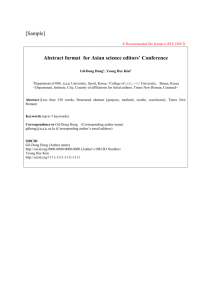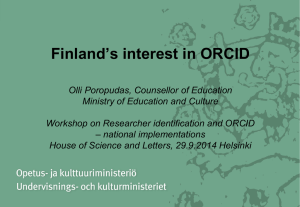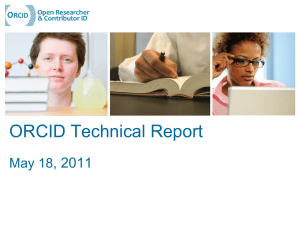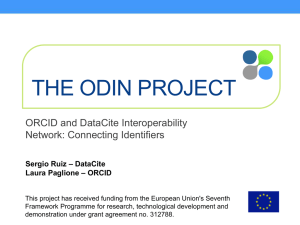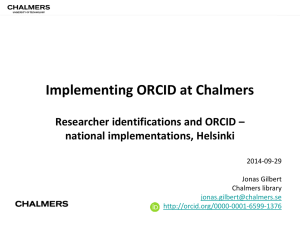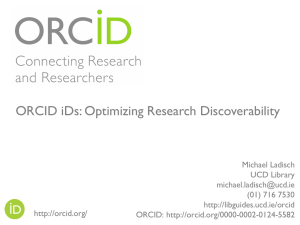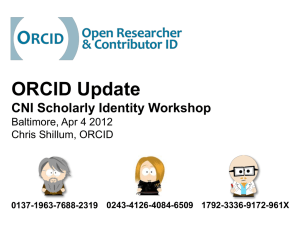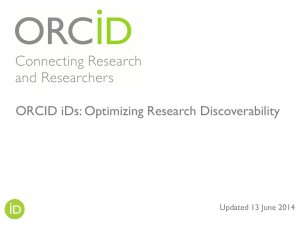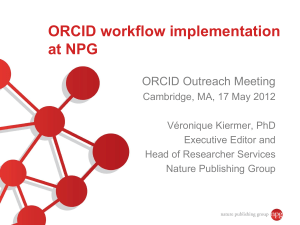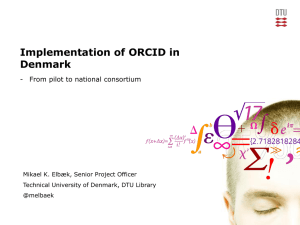Slide - ORCiD
advertisement
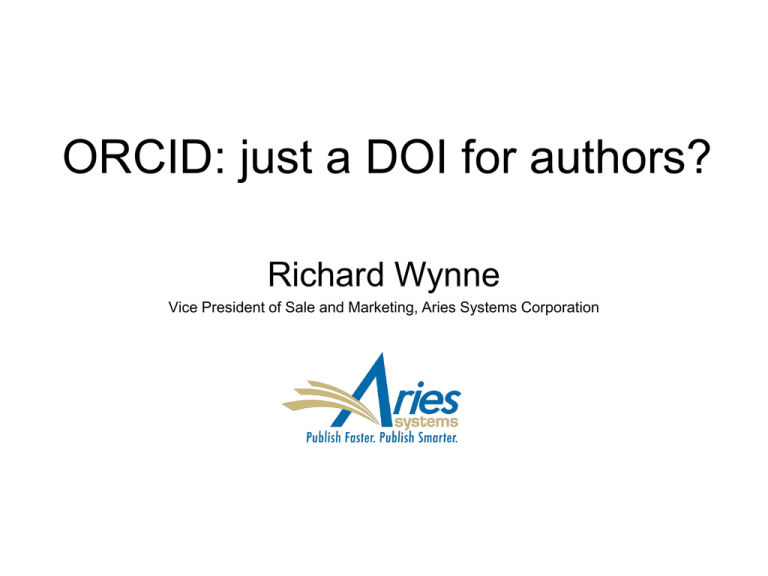
ORCID: just a DOI for authors? Richard Wynne Vice President of Sale and Marketing, Aries Systems Corporation • Chronic “pain points” • Frequently occurring • Re-assemble everything Solution! • Not completely broken • Repeatedly dealing with same problem • Temporary, unsatisfactory fixes • 15 years! • Elegant technical solution available Pain Point: “attribution” Pain Point: authors not systematically recognized for their publications in the bibliographic record Good news! ORCID aims to solve the author/contributor name ambiguity problem in scholarly communications by creating a central registry of unique identifiers ORCID as metadata – capturing author and co-author ORCIDs during submission will feed the bibliographic record Editorial Manager Peer Review System • Capture submitting author ORCID • Support for other IDs (e.g. ISNI) • “Optional” or “required”, based on journal/publisher policy 4444-4444-4444-444X • “Optional” or “required” for coauthors • Available now – version 9.2 in Beta testing • “Smart” capture – “fetch” “We see significant advantages to ORCID and have encouraged Aries to support its collection during peer review workflow. We’re keen to deploy the new functionality to the 238 Wolters Kluwer journals using Editorial Manager.” Karen Abramson President &CEO Wolters Kluwer Health Medical Research ““We are committed to ORCID and welcome new functionality in Editorial Manager that will enable its use during submission and peer review .” Jacqueline Thai Senior Editorial Manager, PLoS ONE “Springer SBM processes hundreds of thousands of manuscripts per year so integration of ORCID with Editorial Manager is an essential development” Arjan Grootenboer Executive Vice President Production at Springer Science+Business Media “Discovery & Attribution” Good news! ORCID aims to solve the author/contributor name ambiguity problem in scholarly communications by creating a central registry of unique identifiers Manuscript Supply Chain Chronic Pain Points in “Supply Chain” • • • • • • • • • • Registration and data collection Multiple credentials Disclosure Co-author management Conflict of interest Cross journal transfer Author fees Authorized communication Workload balancing Permissions, ….many more… Inefficient Unnecessarily complex Repetitive Inconvenient Inflexible Duplicative …etc. Pain Point: registration and data collection • Pain point: repeated registration • Pain point: different registration policies • Pain point: aging data Peer review system ORCID: Biographical information ORCID Data Pain Point: multiple credentials • Pain point: “every publisher and every publisher system requires different sign-in credentials” System 1 System 2 System 3 System 4 ORCID “If the user can sign into ORCID, then give them access to the system” Pain Point: disclosure • Pain point: every journal requires disclosure Peer review system ORCID: Disclosure storage based on ORCID ID Disclosure information Disclosure Data Pain Point: Co-author management • Pain point: laborious entry of co-author information by submitting author • Pain point: data accuracy and currency • Pain point: validation of co-authors by journal Peer review system Coauthor ORCID: Co-author biographical data ORCID Data email to co-author Co-author validated Co-author validates with ORCID log-in Pain Point: conflict of interest • Pain point: when selecting reviewers how do you identify every potential conflict of interest with every contributing author? Peer review system Contributing author ORCIDs ORCID Candidate reviewer ORCID Biographical data concerning prior employment and publications Pain Point: cross journal transfer • Pain point: duplicate work and multiple reviews of the same manuscript Peer review system Intra- and interpublisher manuscript transfer Author and coauthor biographical information Peer review system Author and coauthor biographical information ORCID matching Reviewer and editor biographical information Reviewer and editor biographical information ORCID matching Pain Point: author fees • Pain point: high administration costs to process author fees (not just OA fees: page charges, color fees etc.) Diagnosis: High levels of complexity limits automation. For example, discounts based on: membership, institution, geographical location, journal subscription, etc. How will ORCID help? A validated author ORCID provides accurate biographic information. This means that author fee level can be automatically determined. E.g. The OA fee for authors from MIT is $X. The future: High levels of automation will allow new, flexible author “point” pricing models – built into the workflow - with greatly reduced “friction” These highly beneficial solutions can only be built on an author “validated” ORCID – “dumb” metadata are not enough Question: How do you get the contributor to validate their ORCID? Context: Editorial Manager: 4,600 Journals. 200+ Publishers. Millions of registered users. One time validation - technical Contributor record in Editorial Manager peer review system: 4444-4444-4444-444X 4444-4444-4444-444X Possible example Addressing a pain point Benefit: Authors will can normalize their log-in credentials (single UN/PW) across different systems and publishers Benefit: Author updates their information in one place (ORCID), and updates can be collected by external systems “Just hypertext” • • • • • Not just hypertext Not proprietary Networked Network effects Fundamental change in the ROI for developers Summary • ORCID as metadata will help improve “attribution” problem during discovery • But “attribution” is not the only “pain point” in scholarly publishing workflow • Author “Validated” ORCIDs are key to addressing these pain points • Dynamic, focused, collaborative and entrepreneurial organizations see opportunities to address these chronic scholarly publishing “pain points” ORCID: much more than just a DOI for authors! Richard Wynne Vice President of Sale and Marketing, Aries Systems Corporation
